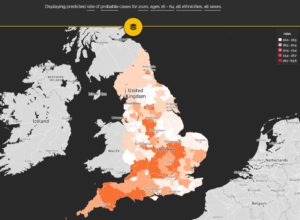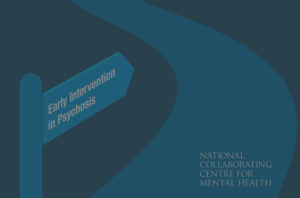Scientific Summary
 Mental health service policymakers require evidence-based information to optimise effective care provision based on local need, but tools are unavailable.
Mental health service policymakers require evidence-based information to optimise effective care provision based on local need, but tools are unavailable.
We sought to develop and validate a population-level prediction model for need for early intervention psychosis (EIP) care for first episode psychosis (FEP) in England up to 2025, based on epidemiological evidence and demographic projections.
 We used Bayesian Poisson regression to model small-area-level variation in FEP incidence for people aged 16-64 years old. We compared six candidate models, validated against observed national NHS FEP data in 2017. Our best-fitting model predicted annual incidence caseloads for EIP services in England up to 2025 for
We used Bayesian Poisson regression to model small-area-level variation in FEP incidence for people aged 16-64 years old. We compared six candidate models, validated against observed national NHS FEP data in 2017. Our best-fitting model predicted annual incidence caseloads for EIP services in England up to 2025 for
- Probable FEP;
- Treatment in EIP services (treated caseloads);
- Initial assessment by EIP services (assessed caseloads), and;
- Referral to EIP services for “suspected psychosis” (referred caseloads)
Forecasts were stratified by sex, age and ethnicity at national and Clinical Commissioning Group levels.
See our detailed Methodology page for more details.
 A model with age, sex, ethnicity, small-area-level deprivation, social fragmentation and regional cannabis use provided best fit to observed new FEP cases at national- and CCG-levels in 2017 (predicted=8,112; 95% interval: 7,623-8,597; observed=8,038; difference=+74; +0.92%).
A model with age, sex, ethnicity, small-area-level deprivation, social fragmentation and regional cannabis use provided best fit to observed new FEP cases at national- and CCG-levels in 2017 (predicted=8,112; 95% interval: 7,623-8,597; observed=8,038; difference=+74; +0.92%).
By 2025, the model forecasted 11,067 new treated cases per annum (95% interval, 10,383 to 11,740).
For every ten new treated cases, 21 and 23 people would be assessed by and referred to EIP services, respectively, for suspected psychosis.
You can access the PsyMaptic prediction data for EIP services via our visualisation dashboard or as downloadable datasets. Prediction data is made available as Open Access data under a Creative Commons BY-SA licence. Read here for further details.
 Our evidence-based methodology provides an accurate, validated tool to inform clinical provision of EIP services about future population need for care, based on local variation of major social determinants of psychosis.
Our evidence-based methodology provides an accurate, validated tool to inform clinical provision of EIP services about future population need for care, based on local variation of major social determinants of psychosis.
Our predictions are being used by NHS England and informs current NICE guidelines for EIP planning. See our Impact section for more details.